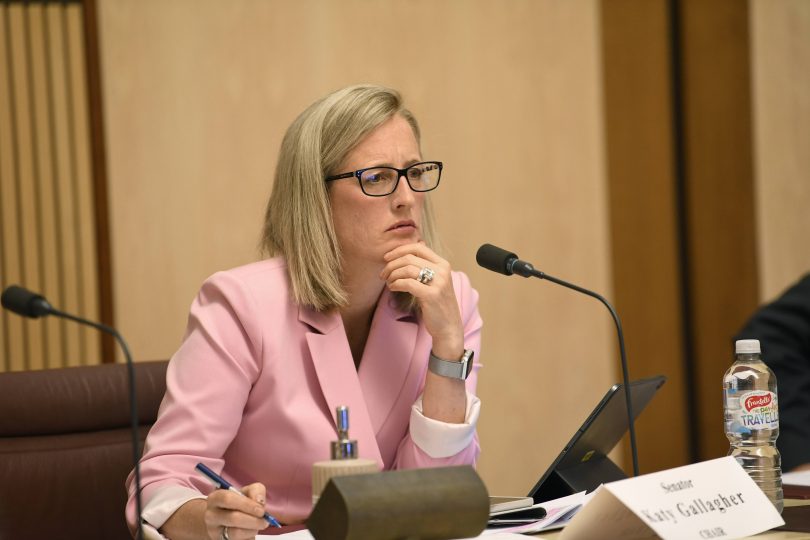
Senator Gallagher has spent three years grilling government officials during Senate Estimates. Photo: Auspic.
The Australian Public Service Commission has been reduced to window dressing under Coalition governments and should take on a much more vigorous leadership role to ensure the bureaucracy has the capability to do its job, according to the woman who could be Public Service Minister in a Labor Government.
Senator Katy Gallagher outlined Labor’s priorities for the APS to Region Media, focusing on rebuilding capability, reducing reliance on consultancies and labour-hire, and negotiating with staff representatives on pay and conditions in good faith.
Senator Gallagher said that the mainly “presentational” APSC had been basically sidelined and made redundant when it had a “massive role to play in terms of leadership, standards, excellence – all of the issues that are important to the APS”.
“The APSC should be leading that work and it should be given the authority to do it, and it should be seen up next to PM&C as one of the most important bodies for the direction of the APS,” she said.
Senator Gallagher said the APSC should be at the forefront of the reforms that the Thodey Review recommended.
“I’ve sat around the estimates table and I struggle to see what it’s doing,” Senator Gallagher said.
“And I think that’s partly because it’s not being given any responsibility because it comes back to the view that the public service is there to run Ministers’ stuff and not as an enduring institution that is worth protecting and investing in.”
My Public Sector
Asked whether the APSC should be a more robust advocate for how the public service is run, Senator Gallagher said: “If I were the minister, I would be very happy with that … it’s more in the PM’s portfolio, but a really strong central body like that is critical to the enduring nature of the APS, and that it goes beyond the political cycle and actually is there for a reason for the long term.
“The Commission at the moment isn’t able to do any of that, or has any interest in doing that.”
If Labor does win the looming federal election, the APS is in for a big shake-up.
Senator Gallagher said public servants would have a government that appreciates and understands the role and importance of the APS as an institution, that wants to rebuild internal capability and capacity and get the balance right between the public and private sector, and wants to work in partnership with them.
That includes abolishing the ASL staffing cap, converting inappropriate temporary contracts to permanent positions, conducting an audit to identify insecure work within the APS; limiting the number of consecutive fixed-term contracts an employer can offer for the same role, with an overall cap of 24 months; and ensuring labour-hire staff receive no less than workers employed directly.
Senator Gallagher said that for Labor to implement its policies, it was fundamental that the APS could do its job properly.
After nine years of Coalition government, change would not happen overnight, but Senator Gallagher said it would be important to bring policy expertise back into the APS and to stop the expensive use of labour-hire due to the staffing cap in areas that should be staffed permanently.
She was not ‘anti-consultant’ but said the balance was “out of whack” and the APS was outsourcing core functions that should be done by policy units within the APS.
The deep thinking that tackles wicked problems was very “hit and miss” across the APS.
“The Department of Social Services has hardly any policy capability at all, yet they’re running the biggest programs in terms of social support,” Senator Gallagher said.
She said Veterans’ Affairs and the Aged Care Quality and Safety Commission employed a quarter of their staff on labour-hire contracts for work that should be done by permanent staff.
The government justified the use of labour-hire by saying it provided surge capacity in times of need, but Senator Gallagher rejected this, saying it was being used in places where the work was not a temporary response.
She said the staffing cap had distorted recruitment practices and costs.
“They’re paying 20 to 30 per cent more under labour-hire than they would if they employed them permanently,” Senator Gallagher said.
She said the Commonwealth was paying out $2 million a day on consultants and labour contracts.
Labor research had shown its proposed changes, including creating more permanent positions, would not lead to a blowout in costs.
“It requires a reshift and realignment of resources, but we are not expecting that we will require any reinvestment,” Senator Gallagher said.
She accused the government of mothballing the Thodey Review and said she expected there would be a submission to a Labor cabinet on its recommendations.
One recommendation that the government has not embraced is for a more standard pay and conditions structure. Senator Gallagher said that would be difficult to achieve given how disparate agencies now were, but it was a goal worth aspiring to because as ties in with Thodey’s call for more needs-based staff mobility across the APS.
“At the moment, that’s really difficult because people go, ‘well no, I’ve had a look at what you’ve got over there, and it’s not as good as what I’m on here,” she said.
There is no mention of the infamous efficiency dividends in Labor’s policy statement, and the APS may see the back of them if Labor is elected.
Senator Gallagher said that while the government had a responsibility to constantly drive for efficiencies, they were very blunt instruments to achieve them.
Asked whether a Labor Government would reverse the closure of Services Australia offices like the one in Braddon, Senator Gallagher said its spokesperson Bill Shorten would have more to say on that during the campaign.
But as a principle, Labor believed in-person support was important.




















